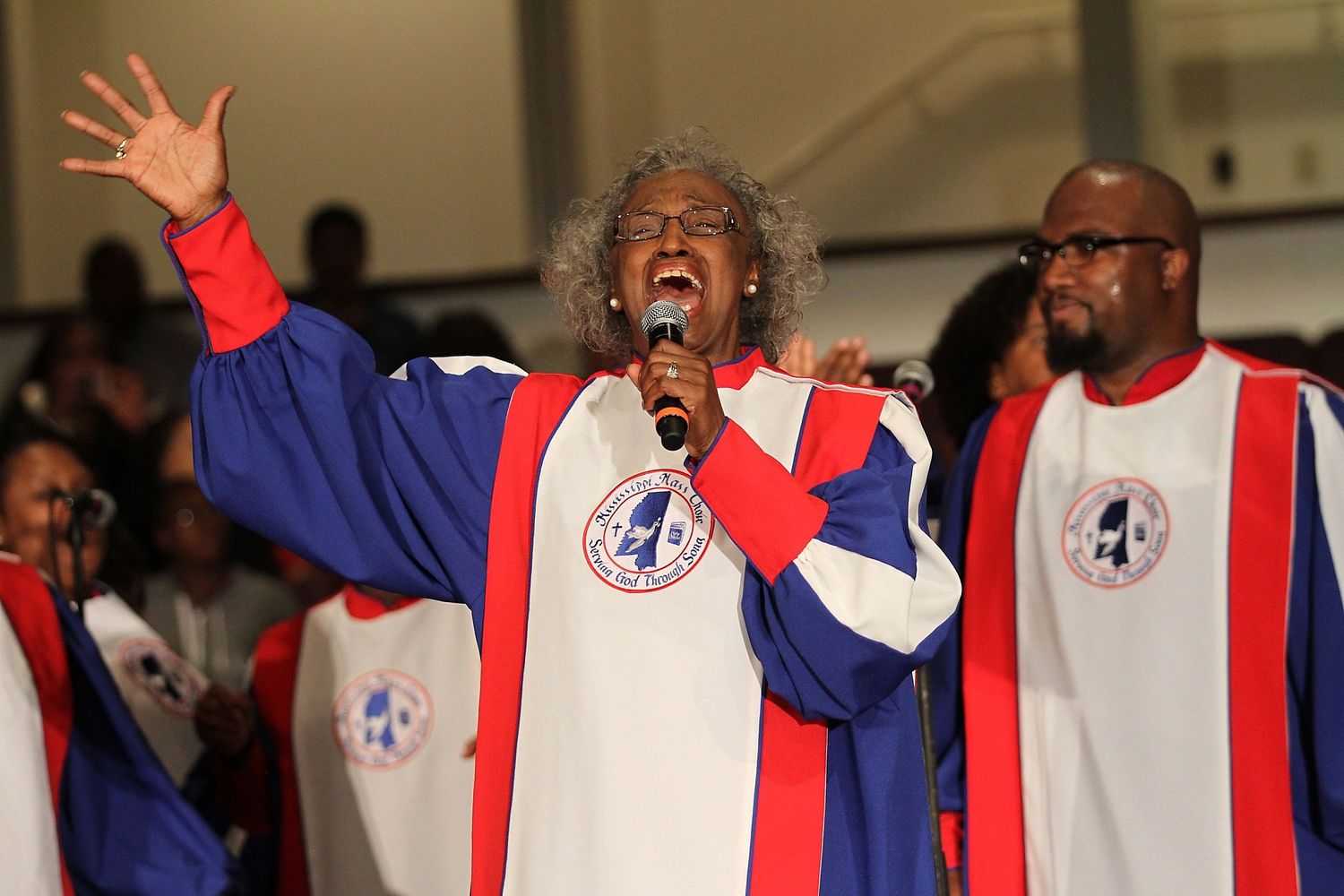Home>Production & Technology>Choir>Choir Members Who Don’t Practice


Choir
Choir Members Who Don’t Practice
Published: February 23, 2024
Discover how to motivate choir members to practice and improve their singing skills. Learn effective strategies for engaging and inspiring your choir to reach their full potential.
(Many of the links in this article redirect to a specific reviewed product. Your purchase of these products through affiliate links helps to generate commission for AudioLover.com, at no extra cost. Learn more)
Table of Contents
Introduction
Being part of a choir is a richly rewarding experience that fosters a sense of unity, creativity, and joy. However, every choir director knows that maintaining a high level of performance requires dedication and practice from each member. In an ideal world, every choir member would eagerly embrace their individual practice sessions, honing their vocal skills and internalizing the harmonies. Unfortunately, this is not always the case. Choir directors often encounter the challenge of motivating members who don't prioritize practice.
The reasons for this lack of commitment to practice can vary widely. Some members may struggle to find the time amidst their other commitments, while others may lack confidence in their abilities and feel discouraged. Additionally, external factors such as personal challenges or competing priorities can also contribute to a decline in practice consistency. These obstacles can hinder the choir's progress and prevent it from reaching its full potential.
Understanding the impact of inconsistent practice on the choir's overall performance is crucial. It can lead to a lack of cohesion in vocal sections, resulting in a less polished and harmonious sound. Furthermore, individual members who do not practice may feel unprepared during rehearsals, leading to inefficiencies and a disjointed overall performance. This can be disheartening for both the members and the director, as it detracts from the collective goal of creating beautiful music together.
In response to these challenges, choir directors must devise strategies to encourage and support members in their practice endeavors. By cultivating a positive and motivating environment, directors can inspire members to prioritize practice and reap the rewards of their collective efforts. Through effective communication and tailored support, directors can empower each member to embrace their role in contributing to the choir's success.
In the subsequent sections, we will delve deeper into the reasons behind members' lack of practice, explore the impact of this phenomenon on choir performance, and discuss actionable strategies for nurturing a culture of commitment and dedication within the choir. By addressing these aspects, choir directors can navigate the complexities of member engagement and elevate the choir's overall performance.
Reasons for Not Practicing
There are various reasons why choir members may struggle to prioritize practice sessions, and understanding these factors is essential for devising effective strategies to address the issue. One common obstacle is the hectic nature of modern life. Many choir members juggle multiple responsibilities, including work, family commitments, and other extracurricular activities. As a result, finding dedicated time for practice can be challenging, leading to inconsistent participation in individual vocal exercises.
Furthermore, some choir members may experience a lack of confidence in their vocal abilities. This self-doubt can stem from past experiences, personal insecurities, or a fear of judgment from peers. Consequently, individuals may feel reluctant to engage in practice sessions, fearing that their vocal performance may not meet the choir's standards. This psychological barrier can hinder their willingness to invest time and effort in honing their vocal skills.
External factors, such as personal challenges or unexpected life events, can also disrupt a choir member's practice routine. Whether it's health issues, family emergencies, or professional demands, these external pressures can divert their attention away from consistent practice. As a result, maintaining a regular practice schedule becomes a lower priority, impacting their overall contribution to the choir's collective sound.
Moreover, some choir members may struggle with motivation and focus, finding it difficult to sustain their enthusiasm for individual practice. Without a sense of purpose or intrinsic motivation, the prospect of engaging in vocal exercises may feel daunting or unappealing. This lack of motivation can lead to procrastination and a reluctance to invest time in refining their vocal technique.
Additionally, technological distractions, such as social media, streaming platforms, and digital entertainment, can compete for a choir member's attention, diverting their focus away from practice sessions. In today's interconnected world, the allure of digital engagement can create challenges for individuals striving to maintain a disciplined practice routine.
By recognizing these diverse reasons for not practicing, choir directors can empathize with their members' challenges and tailor supportive strategies to address these barriers. Through proactive measures and targeted support, directors can cultivate an environment that encourages each member to overcome these obstacles and prioritize their practice sessions.
Impact on Choir Performance
Inconsistent individual practice among choir members can significantly impact the overall performance and cohesion of the ensemble. The collective sound of a choir is intricately woven from the harmonies and dynamics of each individual voice. When members do not prioritize their practice sessions, it can lead to a ripple effect that reverberates throughout the choir's performance.
One notable consequence of irregular practice is the lack of vocal cohesion within the ensemble. A choir's ability to blend voices and achieve a seamless, unified sound hinges on the individual members' familiarity with their vocal parts. When some members are underprepared due to insufficient practice, it can disrupt the overall balance and harmony, resulting in a less polished and cohesive performance. This lack of vocal cohesion can be particularly evident during intricate passages or sections where precise synchronization is crucial.
Furthermore, individual members who do not prioritize practice may struggle to internalize the nuances of the music, leading to inefficiencies during rehearsals. This can impede the choir's progress, as valuable rehearsal time is spent addressing basic vocal techniques and refining musical interpretations that could have been mastered during individual practice. As a result, the choir's overall growth and development may be hindered, impacting the quality of its performances.
In addition to the technical aspects, inconsistent practice can also affect the choir's collective confidence and morale. When members feel unprepared due to inadequate practice, it can lead to heightened anxiety and self-doubt during performances. This psychological barrier can detract from the choir's ability to convey emotion and connect with the audience, ultimately diminishing the impact of their musical delivery.
Moreover, the absence of consistent practice can result in missed opportunities for artistic exploration and musical expression. Choir members who do not invest time in refining their vocal skills may struggle to convey the intended dynamics, phrasing, and emotional depth of the music. This can limit the choir's ability to deliver captivating and evocative performances that resonate with audiences on a profound level.
Ultimately, the impact of inconsistent practice on choir performance extends beyond the technical aspects of vocal delivery. It permeates the ensemble's collective identity, affecting its cohesion, confidence, and artistic expression. By recognizing these implications, choir directors can implement strategies to foster a culture of commitment and dedication to individual practice, thereby elevating the choir's overall performance and musical impact.
Strategies for Encouraging Practice
Encouraging consistent and dedicated practice among choir members is essential for nurturing a culture of excellence and elevating the ensemble's overall performance. By implementing tailored strategies, choir directors can inspire and support members in prioritizing their individual practice sessions. These strategies are designed to foster a positive and motivating environment, empowering each member to embrace their role in contributing to the choir's collective success.
-
Clear Communication: Open and transparent communication is fundamental to fostering a culture of commitment to practice. Choir directors should clearly articulate the expectations regarding practice frequency, duration, and the specific areas of focus. By providing a clear roadmap for individual practice, members can approach their sessions with purpose and direction.
-
Personalized Support: Recognizing the diverse needs and challenges faced by choir members is crucial. Directors can offer personalized support by identifying individual strengths and areas for improvement, providing targeted resources, and offering constructive feedback. Tailoring support to each member's unique circumstances can enhance their confidence and motivation to engage in consistent practice.
-
Goal Setting and Progress Tracking: Setting achievable and measurable practice goals can instill a sense of purpose and progress among choir members. Directors can collaborate with individuals to establish realistic milestones and track their development over time. Celebrating milestones and acknowledging progress can reinforce members' commitment to their practice routines.
-
Peer Accountability and Support: Cultivating a supportive and collaborative environment within the choir can encourage peer accountability. Directors can facilitate opportunities for members to engage in peer mentoring, practice partnerships, and constructive feedback exchanges. By fostering a sense of collective responsibility, choir members can motivate and support each other in their practice endeavors.
-
Innovative Practice Techniques: Introducing innovative and engaging practice techniques can invigorate members' approach to individual vocal exercises. Directors can incorporate diverse vocal exercises, visualization techniques, and interactive practice tools to make sessions more enjoyable and effective. By infusing creativity into practice routines, members are more likely to maintain their commitment and enthusiasm.
-
Positive Reinforcement and Recognition: Recognizing and celebrating members' dedication to practice can reinforce their commitment and inspire others to follow suit. Directors can acknowledge individual progress, dedication, and improvement during rehearsals and performances. This positive reinforcement fosters a culture of appreciation and motivates members to continue investing in their practice.
By implementing these strategies, choir directors can create an environment that empowers members to prioritize their individual practice, ultimately enhancing the choir's cohesiveness, confidence, and overall performance. Through proactive support and a shared commitment to excellence, choir members can collectively contribute to the realization of the ensemble's artistic vision and musical impact.
Conclusion
In conclusion, the commitment to individual practice is integral to the collective success and artistic excellence of a choir. By recognizing the diverse reasons for members' lack of practice and understanding the impact of inconsistent practice on the ensemble's performance, choir directors can devise targeted strategies to foster a culture of commitment and dedication within the choir.
It is evident that the reasons for not practicing are multifaceted, ranging from time constraints and lack of confidence to external pressures and technological distractions. By acknowledging these challenges, choir directors can empathize with their members' circumstances and implement supportive measures to address these barriers effectively.
The impact of inconsistent practice on choir performance extends beyond technical proficiency, permeating the ensemble's cohesion, confidence, and artistic expression. When members prioritize their individual practice sessions, it enhances the choir's vocal cohesion, efficiency during rehearsals, and overall confidence, leading to more captivating and evocative performances.
To encourage consistent practice, choir directors can employ strategies such as clear communication, personalized support, goal setting, peer accountability, innovative practice techniques, and positive reinforcement. By creating a supportive and motivating environment, directors can empower each member to embrace their role in contributing to the choir's collective success.
Ultimately, the collective commitment to individual practice fosters a sense of unity, purpose, and shared dedication within the choir. It elevates the ensemble's performances, enabling them to convey emotion, connect with audiences, and realize their artistic vision with depth and authenticity.
In essence, the journey toward excellence in choral performance is a collaborative endeavor, rooted in the dedication and passion of each choir member. By nurturing a culture of commitment to practice, choir directors can inspire members to embrace their individual roles, contributing to the collective tapestry of harmonious voices that define the choir's artistic impact. Through proactive support and a shared commitment to excellence, choir members can collectively elevate the ensemble's performances, captivating audiences and enriching the musical landscape with their collective artistry.











